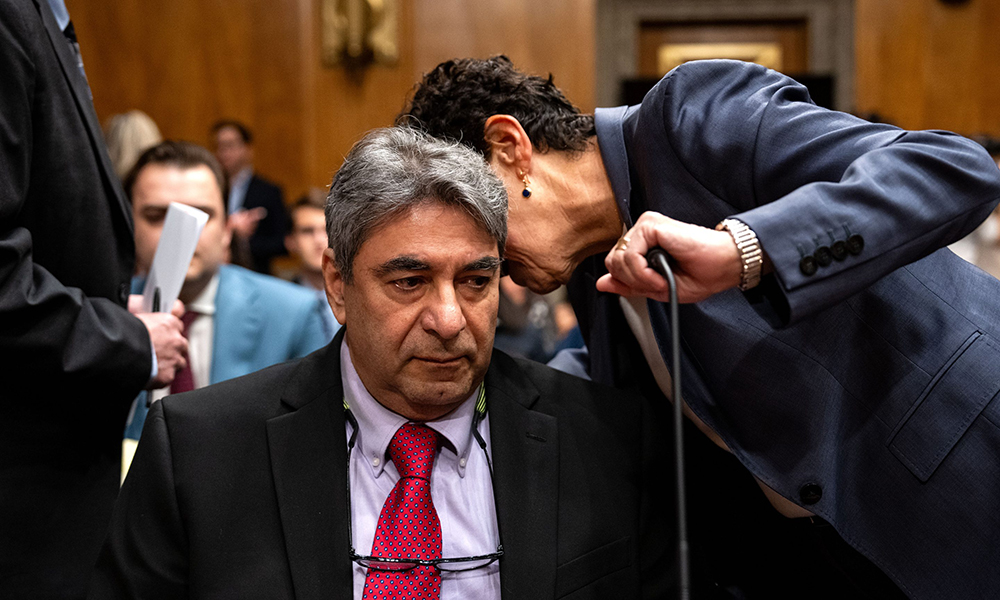
波音(Boeing)正在强颜欢笑。几个月来,已经有两位吹哨人死亡,美国联邦航空管理局(Federal Aviation Administration)在5月6日开始对波音展开调查,该飞机制造商却表示,要“赞扬”最近对公司的安全文化发出警告的员工。
波音787项目副总裁兼总经理斯科特·斯托克在4月29日写给员工的备忘录中称,一名员工举报了他在对机翼和机身连接处进行质量检查时发现的问题。对该问题的进一步调查发现,有多名员工未能按照要求完成检查。虽然斯托克没有具体说明被举报的违规行为的性质,但他在这份备忘录里讨论了公司的举报文化,并称赞了那位举报的员工。
斯托克说:“我们要利用这个机会赞扬举报者,并提醒我们,作为一个团队,哪些行为是我们可以接受和不能接受的。”
他向员工重申,波音对于不遵守公司安全和质量规范的行为坚持“零容忍政策”。备忘录称,员工举报的问题和公司的调查结果很快就报告给美国联邦航空管理局,没有导致航班或安全问题。
斯托克表示:“我想亲自感谢和表扬这位同事做了正确的事情。关键是任何人在看到问题或需要关注的情况时,都应该大声说出来。”
波音向美国联邦航空管理局的报告,促使该监管机构对波音未能充分检查梦想客机和南卡罗来纳州工厂的工人伪造飞机记录等情况,展开了调查。美国联邦航空管理局在一份声明中告诉《财富》杂志,它将要求波音“[重新检查]所有仍在生产系统中的787客机”,并“制定维护已服役飞机的计划”。
斯托克热情洋溢地称赞举报安全问题的员工,正值波音风雨飘摇的时候。该公司面对的不只有美国联邦航空管理局的另外一项调查(今年3月结束的一项调查发现737 Max生产过程中存在数十项安全问题,之后,美国联邦航空管理局启动了调查),还有多名波音吹哨人的死亡。
波音的供应商Spirit AeroSystems公司45岁的质量审查员约书亚·迪恩在2023年举报了问题缠身的737 Max客机,他在突然感染后于今年5月2日去世。迪恩的姑妈对《时代》杂志(Times)称,他身体状况很好,生活方式也很健康。3月9日,在迪恩去世前不到一个月,在波音工作了32年的约翰·巴尼特自杀身亡,而他在自杀前12个小时,还曾经在指控波音飞机存在氧气面罩缺陷的诉讼中作证。
吹哨人的感受截然不同
波音在最近的备忘录里对举报安全问题的员工的口头支持,与吹哨人在4月17日有关该公司安全文化的参议院听证会上提供的证词,形成了鲜明对比。
在波音工作了30年的元老级质量工程师萨姆·萨勒普尔表示,他举报公司填充飞机面板之间的缝隙的方式不当,而且员工会在飞机部件上跳跃使其对齐,结果遭到了公司的报复。萨勒普尔在证词中称,在他坚持举报问题之后,他的上司不允许他参加会议,并把他调到了另外一个部门。萨勒普尔指出,上司曾经在电话里训斥了他40分钟,并取消了他的医生预约。
他说:“我被忽视了。我被告知不要导致延误,他们直白地让我闭嘴。”
参议院听证会结束后的第二天,对波音的一起诉讼进一步证明了这位举报者遭到报复的说法。波音工会美国航空航天专业工程雇员协会(Society of Professional Engineering Employees in Aerospace)指控,2022年,其两名成员就公司的安全实践与上司争论了六个月,后来就收到了相同的负面绩效评估。这两名员工表示,他们不敢使用公司的“畅所欲言”计划,因为担心公司会忽视他们的投诉。
波音称,这些指控没有事实根据,而且公司鼓励员工畅所欲言,但美国航空航天专业工程雇员协会的执行董事雷伊·戈福斯却指出,波音隐瞒了美国联邦航空管理局的报告,没有与工会分享,尽管按照联邦法律规定它必须这样做。
戈福斯在上个月的一份声明里对《财富》杂志表示:“波音已经失去了人们的信任,人们无法再相信它。”(财富中文网)
译者:刘进龙
审校:汪皓
波音(Boeing)正在强颜欢笑。几个月来,已经有两位吹哨人死亡,美国联邦航空管理局(Federal Aviation Administration)在5月6日开始对波音展开调查,该飞机制造商却表示,要“赞扬”最近对公司的安全文化发出警告的员工。
波音787项目副总裁兼总经理斯科特·斯托克在4月29日写给员工的备忘录中称,一名员工举报了他在对机翼和机身连接处进行质量检查时发现的问题。对该问题的进一步调查发现,有多名员工未能按照要求完成检查。虽然斯托克没有具体说明被举报的违规行为的性质,但他在这份备忘录里讨论了公司的举报文化,并称赞了那位举报的员工。
斯托克说:“我们要利用这个机会赞扬举报者,并提醒我们,作为一个团队,哪些行为是我们可以接受和不能接受的。”
他向员工重申,波音对于不遵守公司安全和质量规范的行为坚持“零容忍政策”。备忘录称,员工举报的问题和公司的调查结果很快就报告给美国联邦航空管理局,没有导致航班或安全问题。
斯托克表示:“我想亲自感谢和表扬这位同事做了正确的事情。关键是任何人在看到问题或需要关注的情况时,都应该大声说出来。”
波音向美国联邦航空管理局的报告,促使该监管机构对波音未能充分检查梦想客机和南卡罗来纳州工厂的工人伪造飞机记录等情况,展开了调查。美国联邦航空管理局在一份声明中告诉《财富》杂志,它将要求波音“[重新检查]所有仍在生产系统中的787客机”,并“制定维护已服役飞机的计划”。
斯托克热情洋溢地称赞举报安全问题的员工,正值波音风雨飘摇的时候。该公司面对的不只有美国联邦航空管理局的另外一项调查(今年3月结束的一项调查发现737 Max生产过程中存在数十项安全问题,之后,美国联邦航空管理局启动了调查),还有多名波音吹哨人的死亡。
波音的供应商Spirit AeroSystems公司45岁的质量审查员约书亚·迪恩在2023年举报了问题缠身的737 Max客机,他在突然感染后于今年5月2日去世。迪恩的姑妈对《时代》杂志(Times)称,他身体状况很好,生活方式也很健康。3月9日,在迪恩去世前不到一个月,在波音工作了32年的约翰·巴尼特自杀身亡,而他在自杀前12个小时,还曾经在指控波音飞机存在氧气面罩缺陷的诉讼中作证。
吹哨人的感受截然不同
波音在最近的备忘录里对举报安全问题的员工的口头支持,与吹哨人在4月17日有关该公司安全文化的参议院听证会上提供的证词,形成了鲜明对比。
在波音工作了30年的元老级质量工程师萨姆·萨勒普尔表示,他举报公司填充飞机面板之间的缝隙的方式不当,而且员工会在飞机部件上跳跃使其对齐,结果遭到了公司的报复。萨勒普尔在证词中称,在他坚持举报问题之后,他的上司不允许他参加会议,并把他调到了另外一个部门。萨勒普尔指出,上司曾经在电话里训斥了他40分钟,并取消了他的医生预约。
他说:“我被忽视了。我被告知不要导致延误,他们直白地让我闭嘴。”
参议院听证会结束后的第二天,对波音的一起诉讼进一步证明了这位举报者遭到报复的说法。波音工会美国航空航天专业工程雇员协会(Society of Professional Engineering Employees in Aerospace)指控,2022年,其两名成员就公司的安全实践与上司争论了六个月,后来就收到了相同的负面绩效评估。这两名员工表示,他们不敢使用公司的“畅所欲言”计划,因为担心公司会忽视他们的投诉。
波音称,这些指控没有事实根据,而且公司鼓励员工畅所欲言,但美国航空航天专业工程雇员协会的执行董事雷伊·戈福斯却指出,波音隐瞒了美国联邦航空管理局的报告,没有与工会分享,尽管按照联邦法律规定它必须这样做。
戈福斯在上个月的一份声明里对《财富》杂志表示:“波音已经失去了人们的信任,人们无法再相信它。”(财富中文网)
译者:刘进龙
审校:汪皓
Boeing is smiling through the pain. After two whistleblower deaths in as many months and a Federal Aviation Administration investigation into the company opened on May 6, the aircraft manufacturer said it will “celebrate” its latest employee to raise a red flag on the company’s safety culture.
Scott Stocker, vice president and general manager of Boeing’s 787 Program, wrote in a memo to employees on April 29 that an employee spoke out against an issue he saw during a quality test on where a jet’s wing meets its body. Further investigation into the issue revealed that several employees failed to complete the required tests. While Stocker did not go into detail about the nature of the reported irregularities, he did use the memo as an opportunity to discuss the company’s whistleblowing culture and applaud the employee for voicing concerns.
“We will use this moment to celebrate him, and to remind us all about the kind of behavior we will and will not accept as a team,” Stocker said.
He reiterated to employees that Boeing has a “zero-tolerance policy” for not following company safety and quality protocols. The concern the employee reported and the company’s findings, which were immediately reported to the FAA according to the memo, did not result in an immediate flight or safety problem.
“I wanted to personally thank and commend that teammate for doing the right thing,” Stocker said. “It’s critical that every one of us speak up when we see something that may not look right, or that needs attention.”
Boeing’s report to the FAA prompted the regulatory body to open a probe into Boeing’s failure to adequately inspect the Dreamliner aircrafts and employees falsifying records about the planes at a South Carolina facility. The FAA will require Boeing to “[reinspect] all 787 airplanes still within the production system” and “create a plan to address the in-service fleet,” it told Fortune in a statement.
Stocker’s effusive sentiments toward employees speaking up about safety concerns come at a precarious time for Boeing. Not only is the company contending with another FAA probe—following an investigation wrapped in March that found dozens of safety concerns with 737 Max production—but also the deaths of multiple Boeing whistleblowers.
Joshua Dean, a 45-year-old a quality auditor at Boeing supplier Spirit AeroSystems who spoke out in 2023 about the trouble-laden 737 Max models, died on May 2 after a sudden infection. Dean’s aunt told the Times he was in good shape and led a healthy lifestyle. On March 9, less than a month before Dean’s death, John Barnett, a Boeing employee for 32 years, died by suicide 12 hours after testifying on the company’s allegedly faulty oxygen masks on its flights.
Whistleblowers tell a different story
Boeing’s vocal support in its recent memo for employees reporting safety concerns is a stark contrast to the testimonies Boeing whistleblowers shared in a Senate hearing on April 17 about the company’s safety culture.
Sam Salehpour, a quality engineer and 30-year veteran at Boeing, said the company retaliated against him for reporting improperly filled gaps between aircraft panels and employees jumping on aircraft parts to make them align. Salehpour’s supervisors stopped him from attending meetings and transferred him to another division after he continued to voice concerns, he explained in his testimony. Salehpour said his supervisor berated him over the phone for 40 minutes at a time and canceled doctor’s appointments on his calendar.
“I was ignored. I was told not to create delays,” Salehpour said. “I was told, frankly, to shut up.”
A lawsuit filed against Boeing the day after the Senate hearing underlined the whistleblower’s retaliation claims. The Society of Professional Engineering Employees in Aerospace (SPEEA), a union for Boeing employees, alleged that two of its members received identical negative performance reviews from the company in 2022 after they argued with supervisors for six months over company safety practices. The two employees said they were afraid to use Boeing’s “Speak Up” protocols out of fear the company would ignore their complaints.
Boeing said the allegations were unsubstantiated and that it encourages employees to speak up, but SPEEA executive director Ray Goforth said Boeing hid the report from the FAA and did not share it with the union, despite it being required to do so under federal law.
“Boeing has forfeited the right to be taken at its word by anyone,” Goforth told Fortune in a statement last month.






